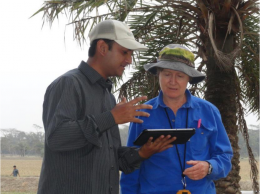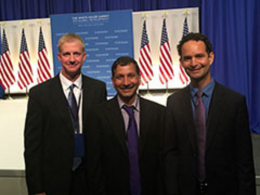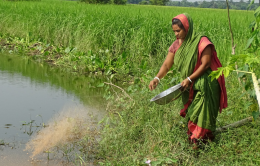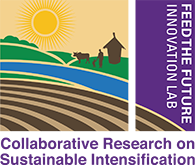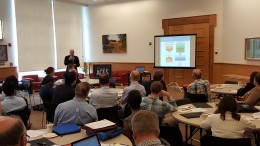 Dr. Prasanta Kalita, director of the ADM Institute for the Prevention of Postharvest Loss (ADMI), and Dr. Alan Hansen, director of the Appropriate Scale Mechanization Consortium (ASMC), highlighted how mechanization and postharvest technologies are critical components for the sustainable intensification of agricultural production during their welcoming address for the Mechanization and Postharvest Opportunities for Smallholders in Sustainable Agriculture Symposium, held July 22 at the University of Illinois. This symposium brought together researchers from around the world working on mechanization and postharvest loss-reducing technologies to strengthen synergistic partnerships between ADMI housed at the University of Illinois and two Feed the Future Innovation labs; the Innovation Lab for Collaborative Research on Sustainable Intensification and the Reduction of Post-Harvest Loss (PHL) Lab housed at Kansas State University.
Dr. Prasanta Kalita, director of the ADM Institute for the Prevention of Postharvest Loss (ADMI), and Dr. Alan Hansen, director of the Appropriate Scale Mechanization Consortium (ASMC), highlighted how mechanization and postharvest technologies are critical components for the sustainable intensification of agricultural production during their welcoming address for the Mechanization and Postharvest Opportunities for Smallholders in Sustainable Agriculture Symposium, held July 22 at the University of Illinois. This symposium brought together researchers from around the world working on mechanization and postharvest loss-reducing technologies to strengthen synergistic partnerships between ADMI housed at the University of Illinois and two Feed the Future Innovation labs; the Innovation Lab for Collaborative Research on Sustainable Intensification and the Reduction of Post-Harvest Loss (PHL) Lab housed at Kansas State University.
At the symposium, the ASMC led discussions on appropriate scale mechanization in Cambodia, Bangladesh, Burkina Faso and Ethiopia. The ADMI highlighted their work in Bangladesh and India including a new initiative in the Bihar region of India. This project focuses on implementing postharvest loss-reducing technologies that match Bihar’s specific challenges related to drying, cleaning, storage, transportation and milling of crops.
This project focus is very similar to the activities being pursued by the ASMC, and thus there is opportunity to share resources and lessons learned. Given that both programs are housed at the University of Illinois and hold similar goals, the ADMI and ASMC are able to collaborate on research that focuses on reducing PHL. In a joint effort, the entities have been developing small-scale dryers to reduce the amount of postharvest loss in countries that rely on high-yielding agricultural practices like Bihar. Symposium attendees had the opportunity to examine one of these dryers first-hand and engage with ADMI and ASMC researchers that developed it. Strengthening the synergies between sustainable intensification, postharvest loss and mechanization, the two groups will continue to engage in projects that aim to ultimately reduce global hunger and poverty.
